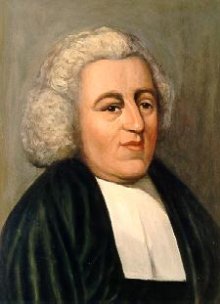John Newton
| John Newton | |
| RELATED TOPICS |
|
| SERMONS, ESSAYS AND OPINIONS |
|
| CONTENTS | |
John Newton (1725 - 1807) was an English clergyman and writer who wrote the hymn "Amazing Grace" after converting to Christianity and abandoning his participation in the slave trade.
John Newton was born in London, the son of a shipmaster in the Mediterranean service. His mother died when he was a child, and he sailed with his father on a total of six voyages until 1742 when his father died. In 1743 he was pressed into naval service, became a midshipman aboard the HMS Harwich, deserted, was recaptured and reduced to the rank of a common seaman, exchanged to a ship in the African station, became a servant to a slave trader, and was rescued in 1748 by a friend of his father's, being converted to Christianity on the way home in a storm at sea. The date was May 10, 1748, an anniversary he observed for the rest of his life. From that point on, he avoided profanity, gambling, and drinking.
He continued at sea till 1754, meanwhile studying Latin and the Bible. It was after much soul searching and Bible reading that Newton saw the horrors of slavery and the hypocrisy it made him feel as a Christian. He soon gave up his association with slave shipping. He was surveyor of tides at Liverpool, England from 1755 to 1760, where he heard George Whitefield and John Wesley preach, and later studied Greek, Hebrew, and Syriac.
In 1763 he was brought to the notice of Lord Dartmouth by Thomas Haweis, through whose influence he was ordained deacon and priest in 1764, and given the curacy of Olney, Buckinghamshire. In 1767 the poet William Cowper settled there, and the result of their friendship was the Olney Hymns (London, 1779 and often), which greatly influenced English hymnology. Other well-known hymns by Newton include Approach, My Soul, the Mercy Seat, Come, My Soul, Thy Suit Prepare and Glorious Things of Thee are Spoken.
In 1779 Newton was invited by John Thornton to become Rector of Saint Mary Woolnoth (Lombard Street, London) where he officiated until his death in 1807. He was a strong supporter of evangelicalism in the Church of England, and was a friend of the dissenting clergy as well as of the ministry of his own church. John Newton died in London and is buried in Olney. Olney also has a museum in his honor.
Among Newton's greatest contributions to history was his encouragement, in 1785, of the newly converted Member of Parliament, William Wilberforce, to stay in Parliament and "serve God where he was," rather than enter the ministry. Wilberforce heeded the ex-slaveship captain's advice, and spent the next five decades successfully working for the abolition of slavery in the British Empire.
Newton was recognized for the longstanding influence of his hymns by the Gospel Music Association in 1982 when he was inducted into the Gospel Music Hall of Fame.
The town of Newton, Sierra Leone is named after John Newton. To this day there is a philanthropic link between John Newton's church of Olney, Milton Keynes and Newton, Sierra Leone.
According to his book "Bury The Chains," Adam Hochschild states that John Newton wrote the hymn "Amazing Grace" while he was still involved in the slave trade.
Quotes
By John Newton
- By one hour's intimate access to the throne of grace, where the Lord causes his glory to pass before the soul that seeks him, you may acquire more true spiritual knowledge and comfort, than by a day or a week's converse with the best of men, or the most studious perusal of many folios.
Links
Return to Famous Christians -> Song writers
Note to users: The wiki is currently operating in safe mode. Editing is limited to users with certain privileges in order to deal with spam. You can create a new user account, and confirm your email ID in order to obtain ability to edit pages. Learn how to be an editor or sysop at WikiChristian.
- Sister projects: WikiMD.com Wellness Encyclopedia & Directory
- Sponsors: WikiChristian is supported by W8MD's medical weight loss and sleep centers.

